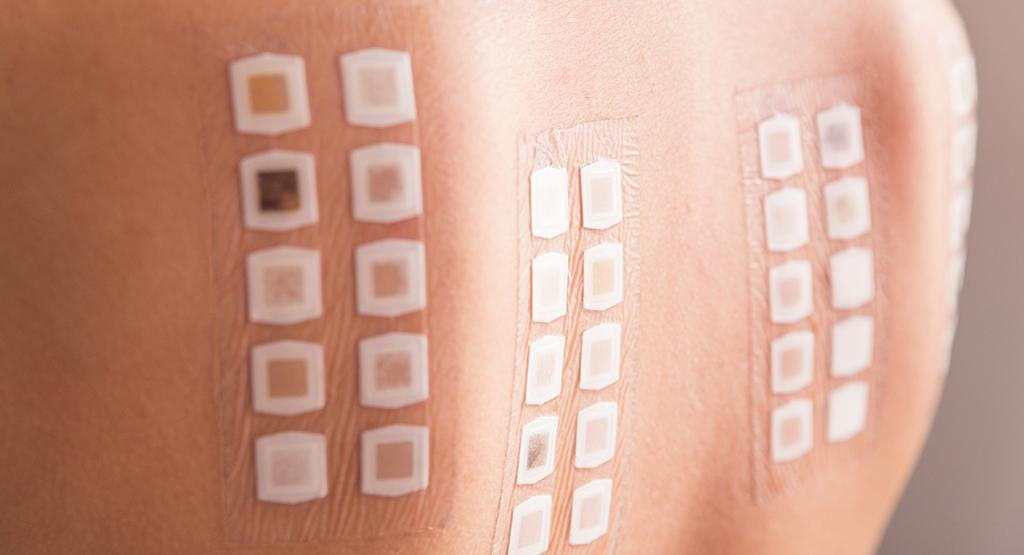
You’ve probably had itchy skin or a rash at some point or another, whether from poison ivy, a mosquito bite, or the chickenpox. But what if your irritated skin seems to come out of nowhere, and worse, reoccurs? It may be a skin allergy.
The American Academy of Allergy, Asthma & Immunology reports that skin allergies account for approximately 5.7 million doctor visits each year. The skin serves as a barrier filled with cells that protect the skin and body against viruses, bacteria, and other threats. Whenever these cells detect a suspicious substance, they begin a chain reaction in the skin that leads to inflammation. The allergic reaction, known as allergic contact dermatitis, occurs when your immune system has an unusual reaction to a harmless substance.
What is Allergic Contact Dermatitis?
A skin allergy, or allergic contact dermatitis, produces a red, itchy rash that sometimes comes with small blisters or bumps. The irritation occurs when the skin comes in contact with an allergen, a usually harmless substance that the immune system attacks. Allergens trigger allergic reactions.
There are several triggers for contact dermatitis including:
- Soaps
- Laundry detergents
- Fabric softeners
- Shampoo
- Excessive exposure to water
- Adhesives
- Nail polish
- Topical medications
- Plants
- Latex gloves
- Metals
Your immune system might not react the first time you encounter an allergen. But over time, it can become sensitive to the substance. As a result, your next contact may lead to inflammation and an allergic reaction. Mild cases of allergic contact dermatitis usually disappear after a few days or weeks. But if the rash persists, is extremely uncomfortable, or occurs on the face, it’s important to see a physician.
Finding the culprit can often be achieved through taking a careful history of recent chemical exposures. To diagnose contact dermatitis, it’s best to visit a dermatologist for non-invasive patch testing of the skin to identify the trigger allergen. Treatment with anti-allergy topical and oral medications helps alleviate and limit suffering.
What About Hives?
If you’ve never experienced a bout of hives, consider yourself lucky. While some people may carry a higher risk for hives, approximately 20 percent of people will experience it at some point in their lives.
Hives, also called urticaria, are red bumps or welts that appear to move around the body from site to site, creating intense itching. They can be as small as a pencil tip or as large as a dinner plate, and fade repeatedly while the reaction runs its course. Press the center of a hive that’s red, and you might even see it turn white, referred to as blanching.
Hives can be caused by a variety of medical conditions, including:
- Allergies
- Blood disorders
- Hormonal imbalance
- Infections
- Stress
Hives can be extremely itchy, not to mention irritating. While they bring an obvious physical burden, they can hinder emotional well-being too, often isolating individuals socially and affecting performance at work and school.
Symptoms of Hives
Hives are often confused with other conditions, but there are a few characteristics that distinguish them — mainly, their movement around the body and their duration. Common symptoms of hives include:
- Red or flesh-colored bumps or welts with clear edges that may reappear in other spots, but typically clearing up within 24 hours
- Bumps or welts that show up individually or clumped together, covering a larger area
- Itchiness, swelling, pain, or stinging around the bumps or welts
If hives last for six weeks or longer, you may be dealing with chronic hives, which can interfere with daily activities. Doctors often can’t identify the reason for chronic hives or why they turn into a long-term issue. In some cases, chronic hives may be related to an underlying illness, such as a thyroid disease or, rarely, cancer.
Contact Windsor Dermatology
Windsor Dermatology physicians can prescribe medications to alleviate the symptoms of hives and perform tests to identify the underlying cause. We’re here to help you with skin allergy and hives relief for all skin types. Schedule your consultation with Windsor Dermatology today!



